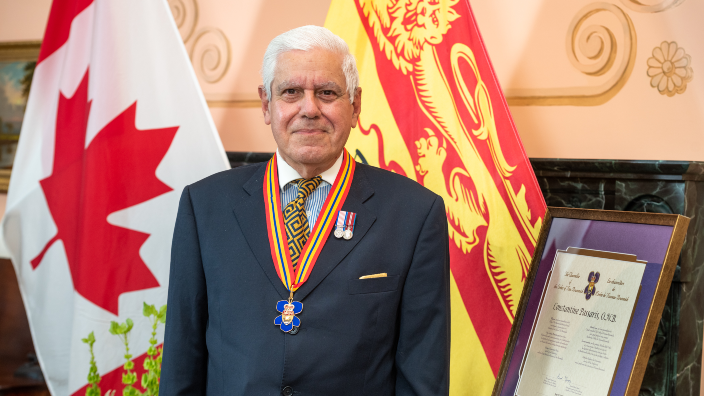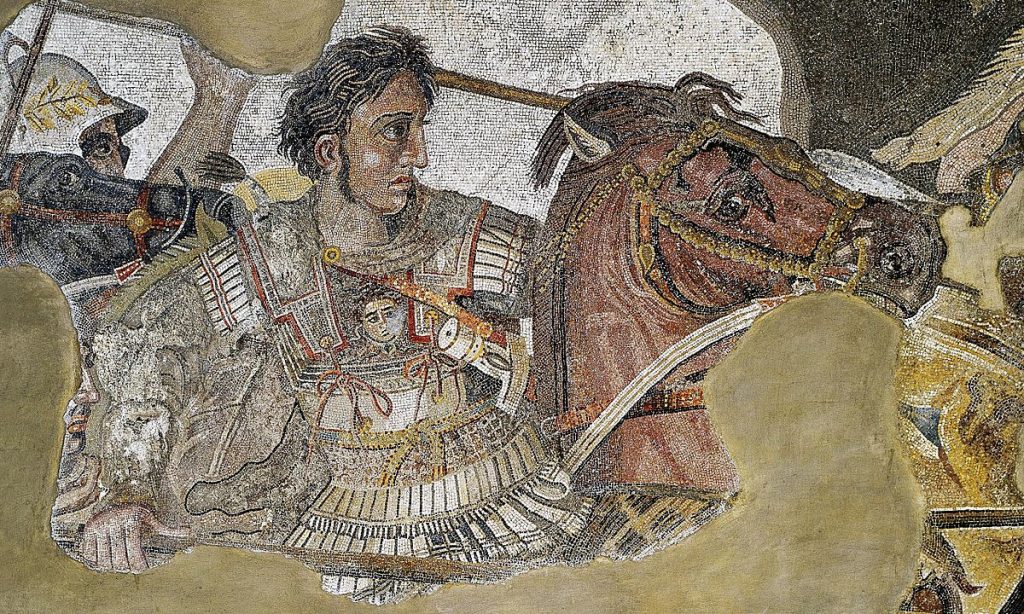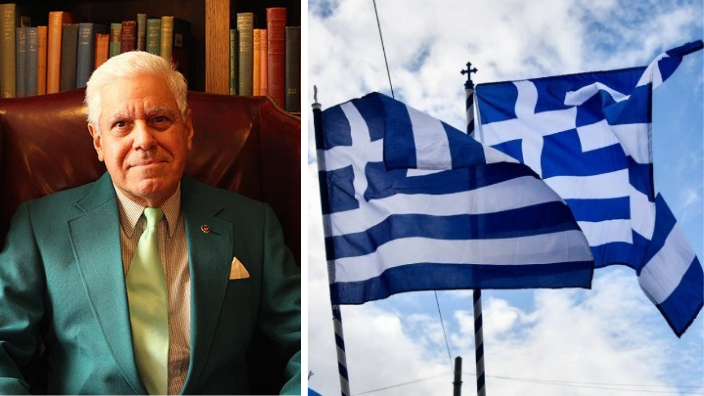By Constantine Passaris.
Last year’s bicentennial celebrations of the Greek revolution of 1821 have spotlighted the passion of the Greek diaspora for their homeland. The celebrations revealed that the contemporary Greek diaspora has a global presence and an overarching international influence. The Greek diaspora radiates a geopolitical soft power that serves as a strategic tool for Greece’s national causes and foreign policy. In modern times, the Greek diaspora have also been benefactors to their homeland through their philanthropy, crises relief, business mentorship, entrepreneurial empowerment, and building economic bridges with Greece for international trade and economic development.
Greece is a small country, with an inquiring mind, an independent spirit and a global outreach. Its sparse population of slightly more than 10 million inhabitants is deceiving. Census reports from around the world estimate that the Greek diaspora, which includes first generation Greek immigrants, and second or third generations of Greek ancestry not born in Greece, exceeds 7 million. In this regard, Greece stands out among the community of nations in exhibiting a significant population dualism where its total population is partitioned between those living in the homeland and the Greek diaspora who are dispersed around the world.
The word diaspora has its roots in the ancient Greek language meaning the scattering of seeds for future growth. Since time immemorial, the Greeks have embraced an adventurous spirit, a peripatetic nature, and a global outreach. In Ancient Greece, Homer recorded that the Greeks have been wanderers and travelers venturing through foreign seas and lands, motivated by trade, science, intellectual curiosity, poverty, or war, and creating colonies and cities far and wide. As a result, the Greek diaspora has been recorded as one of the oldest and largest in the world.

I believe that Alexander the Great personifies the spirit of the Greek diaspora past and present. In effect, Alexander practiced globalisation before the word was invented. The empire he built spanned from Macedonia to Asia and North Africa. His vision for administering the new lands that he conquered included establishing a Greek community to conduct the affairs of state after he had moved on to new conquests.
Furthermore, he embraced a prototype of a multicultural policy which accepted the cultures and traditions of the conquered peoples and integrated the ruling class of the Greeks in such a way that the host society did not feel victimised. I always feel a sense of national pride when my friends and colleagues from countries that Alexander conquered such as present-day Iran, India and Egypt speak fondly and with great respect regarding his accomplishments and legacy in their countries. In this regard, Alexander is not perceived as a malevolent conqueror but as a capable administrator and a cultural benefactor.
The most successful overseas Greek community that was established by Alexander the Great was in Egypt. Ptolemy Soter, a trusted commander of Alexander, ruled Egypt from 305 BC followed by his descendants for more than 300 years until the demise of Queen Cleopatra in 30 BC. During that time, the city of Alexandria, a Greek polis which was founded by Alexander became the capital city and a major center of Greek culture, learning, and trade for several centuries. It was a hub for world trade and the library of Alexandria became a depository for the most valuable original manuscripts and acquired knowledge of those days. Alexandria also emerged as a center of scientific innovation and its iconic lighthouse, one of the seven wonders of ancient world, served as a beacon to the world.

The contemporary Greek diaspora consists of Greek communities living outside the borders of their Greek homeland. In modern history, the Greek diaspora has existed in the Balkans, southern Russia, Asia Minor, eastern Anatolia, the Caucasus, Egypt, and in Corsica. Since the 20th century, the Greek diaspora has extended its reach to every corner of the world including the USA, Canada, South America, Germany and Australia.
In my travels, I have encountered the Greeks of the diaspora across Canada, and overseas in the USA, in Australia, and in Europe. At each destination, I witnessed a strong bonding and a fervent passion among the Greek diaspora for their homeland. As a result, I believe that you can take the Greeks out of Greece, but you cannot take Greece out of the Greeks.
Throughout history, Greeks have left an indelible footprint on western civilization and especially in culture, democracy, visual arts, theatre, literature, philosophy, politics, architecture, music, mathematics, medicine, science, technology, philanthropy, commerce, cuisine, and sports. These significant contributions continue to the present day through the noteworthy contributions of contemporary Greeks of the diaspora through their contributions to their adopted countries and humanity at large.

During important milestones in Greek history, the Greek diaspora has extended a helping hand to their homeland. The Greek diaspora played a foundational role in the struggle for Greek Independence in the 19th century. Through them, Philhellenes around the world were energised to step up and support the ideals of the Greek revolution. During the first and second World Wars, the Greek diaspora sent young men to fight for their homeland. More recently, the Greek diaspora has assisted with crises relief, championed national causes, and served as an advocate for Greek foreign policy by energising political and public opinion in their new homelands.
The 2016 Australian census recorded 397,431 people of Greek ancestry, and 93,740 born in Greece. This makes Australia home to one of the largest Greek diaspora communities in the world. The census also revealed that the Greek community of Melbourne is one of the largest in the world with a Greek Australian population of 173,598 people. In fact, the city of Melbourne has the largest concentration of Greeks after Athens and Thessaloniki in Greece. Sydney comes a close second with 127,274 Greek Australians.
On every occasion that I have visited Melbourne and Sydney I was deeply moved by the Greek communities of both cities for their passion for all things Greek, and for nurturing the Greek language and traditions. Indeed, during my visits to Melbourne, I was thrilled to hear Greek being spoken everywhere I went. It forced me to do a double take to make sure that my plane had landed in Australia and not in Greece.

The largest Greek immigrant stream to Australia commenced after the second World War. The first-generation of Greek Australians were mostly self-employed in the service sector. They established restaurants, retail outlets and small businesses. Having instilled the value of education in their children to improve their career opportunities, the second and third generation of Greek Australians have now joined the ranks of white-collar professionals such as lawyers, accountants, public servants, academics, scientists, engineers, nurses, and medical practitioners.
A second generational change occurred among the Greek Australian diaspora with respect to their political engagement in their new homeland. The first generation of Greek immigrants to Australia were intimately aligned with Greek politics. In consequence, even in a new country, the Greek diaspora continued to fight the party affiliated political battles of their homeland in a new milieu. This is no longer the case in the 21st century. The Greeks who were born in the host society and new immigrant arrivals from Greece have exhibited a tendency to embrace Australian politics and integrate in the political landscape of their host country. The high numbers of candidates of Greek heritage who are nominated as candidates and elected to public office at the municipal, regional, and federal levels serve as testimony to this reversal of political engagement.
The contemporary passion of the Greek diaspora for their homeland is reflected in The Hellenic Initiative (THI). THI is a global philanthropic initiative that is replicated in the USA, Canada, and Australia and connects the Greek diaspora and Philhellenes with Greece. More precisely, it serves as a catalyst for global fundraising, providing direct economic, social, and environmental crises relief as well as opening doors for entrepreneurial initiatives, promoting job creation and economic development in Greece and raising global awareness about key issues of importance to Greece.
Dr. Constantine Passaris is a Professor of Economics at the University of New Brunswick (Canada) and an Onassis Foundation Fellow (Greece). He was recently included in the inaugural edition of Who is Who in Greece 2020 and is the first Greek Canadian to be appointed to the Order of New Brunswick (Canada).
READ MORE: Constantine Passaris becomes first Greek Canadian appointed to the Order of New Brunswick.

